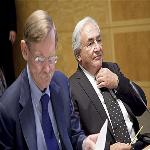07 October 2010

Photo: AP
International Monetary Fund Managing Director Dominique Strauss-Kahn, right, and World Bank President Robert Zoellick prepare for a meeting of the G-24, during the annual IMF and World Bank meetings in Washington, 07 Oct 2010
Top international economic leaders said continuing disputes over currencies and trade could escalate and hurt the fragile economic recovery. The heads of the World Bank and the International Monetary Fund both had blunt warnings Thursday for national and economic leaders.
World Bank President Robert Zoellick says if nations do not stop bickering and start compromising on currency issues, the economic downturn could get far worse. "First, one needs to manage the tensions, if one lets this slide into conflict or forms of protectionism, then we run the risk of repeating the mistakes of the 1930s."
Those mistakes preceded the Great Depression.
The warning comes as the United States, China, European and other nations continue squabbling over the value of currencies. Also, Japan recently intervened in markets to push down the value of its currency, the yen.
Zoellick says the tensions grow out of the slow and uneven economic recovery, which is leaving millions of people out of work. "Whenever you have high unemployment, you have risks of other tensions, we see this now in debates on currencies."
Having a weaker currency can help cut unemployment by boosting exports. It does this by making a nation's products less expensive and easier to sell on international markets. More sales mean more demand for products and more jobs.
That strategy will not work, however, if too many nations try to do it at once. This means the various nations need to work out compromises, but it is hard to make deals right now because high unemployment is putting domestic political pressure on national leaders.
The head of the International Monetary Fund, Dominique Strauss-Kahn, urged political and economic officials to tone down their rhetoric and find less provocative ways to bolster their economies. "Many (nations) do consider their currency as a weapon, and that is certainly not for the good of the global economy."
The IMF chief also sent a message to emerging economies that have been clamoring for a greater voice in IMF decisions. Strauss-Kahn said countries that want to have a greater say also need to accept more responsibility for maintaining a healthy global economy.
The IMF and the World Bank have called for China to allow the value of its currency to rise. But economic experts say one of China's major trading partners, the United States, should also make changes, like cutting budget deficits and boosting savings.